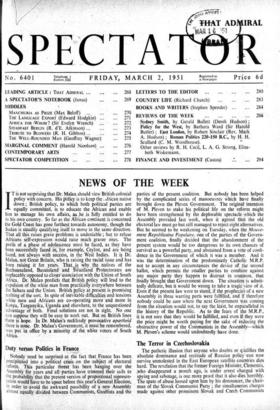NEWS OF THE WEEK
/T is not surprising that Dr. Malan should view British colonial policy with concern. His policy is to keep the . &lean native down ; British policy, to which both political parties are equally committed, is to educate the African and enable him to manage his own affairs, as he is fully entitled to do in his own country. So far as the African continent is concerned the Gold Coast has gone furthest towards autonomy, though the Sudan is steadily qualifying itself to move in the same direction. That all this raises grave problems is undeniable ; but to refuse Africans self-expression would raise much graver ones. The perils of a phase of adolescence must be faced, as they have been successfully faced in, for example, Ceylon, and are being faced, not always with success, in the West Indies. It i. Dr. Malan, not Great Britain, who is raising the racial issue and has been raising it for years. That_il why the natives of the Bechuanaland, Basutoland and Swaziland Protectorates are implacably opposed to closet association with the Union of South Africa. Dr. Malan predicts that British policy will lead to the expulsion of the white man from practically everywhere between the Sahara and the Union. British policy at present is promising nothing of the sort. In spite of inevitable difficulties and tensions white men and Africans are co-operating more and more in Kenya, Tanganyika, Uganda and elsewhere, to the unquestioned advantage of both. Final solutions are not in sight. No one can suppose they will be easy to work out. But on British lines there is hope. In Dr. Malan's recklessly provocative apartheid there is none. Dr. Malan's Government, it must be remembered. was put in office by a minority of the white voters of South Africa.


































